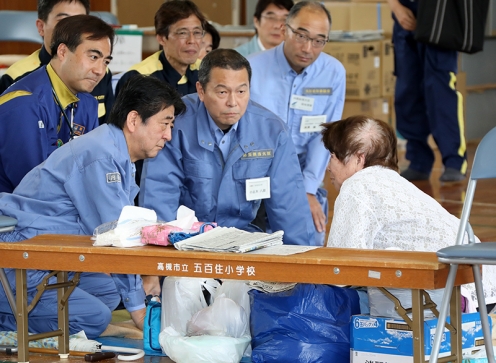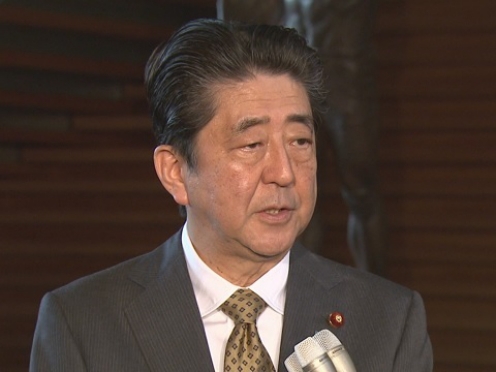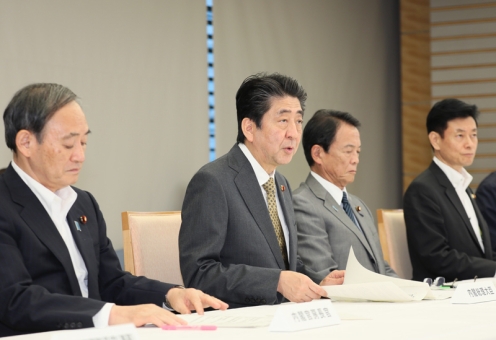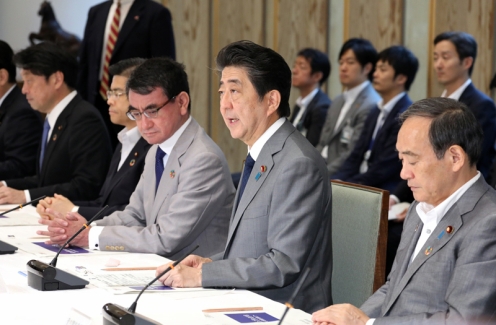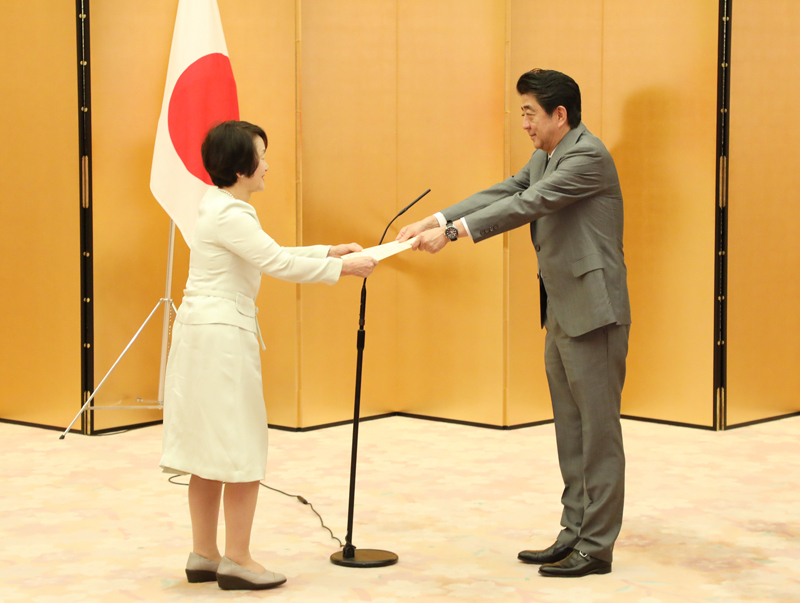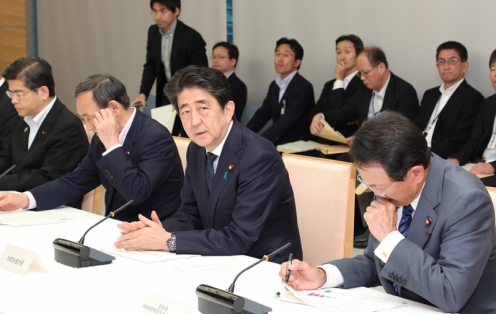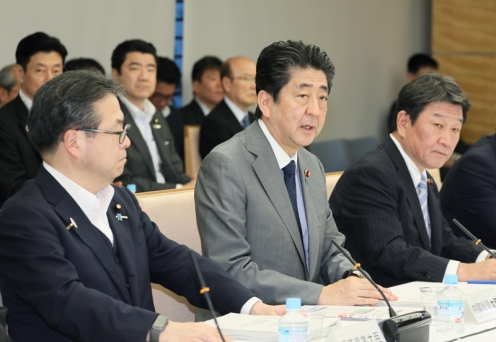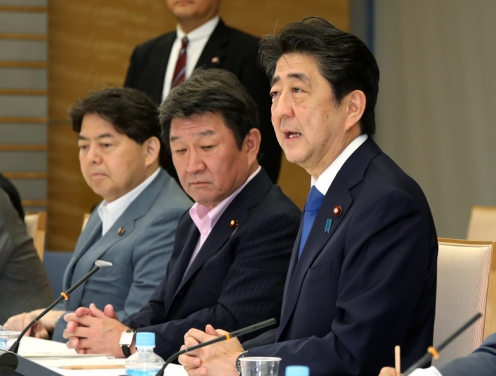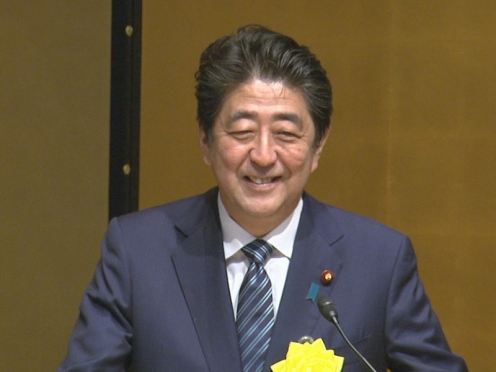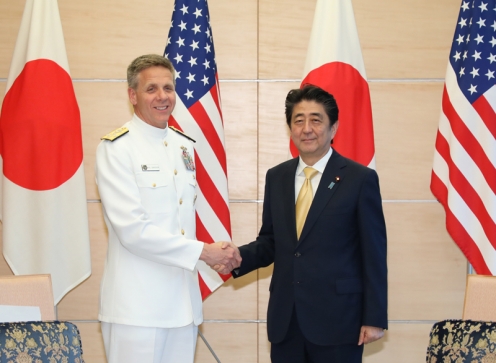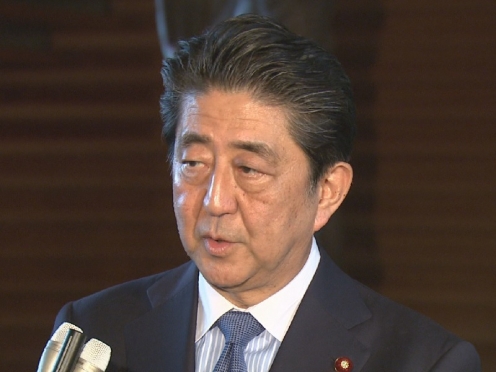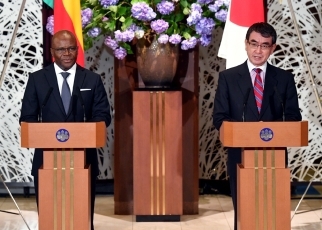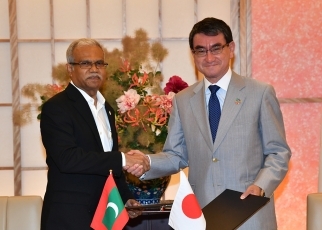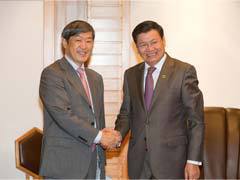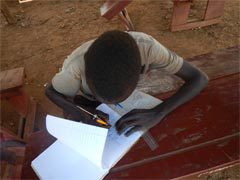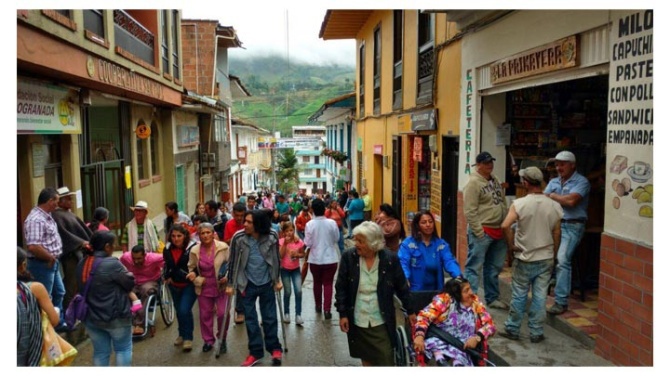Visit to Osaka Prefecture (Inspection of the State of the Damage Caused by the Earthquake with an Epicenter in Northern Osaka Prefecture)
Cabinet Secretariat, Thursday, June 21, 2018
[Provisional translation]
On June 21, 2018, Prime Minister Shinzo Abe visited Osaka Prefecture in order to gauge the state of damage caused by the earthquake with the epicenter in northern Osaka Prefecture.
The Prime Minister first inspected the bathing support activities provided by the Self-Defense Force in Ibaraki City, and then visited the site where a concrete wall at an elementary school in Takatsuki City collapsed due to the earthquake. Following his visit to one of the evacuation centers in Takatsuki City afterwards, the Prime Minister exchanged views with Mr. Ichiro Matsui, Governor of Osaka Prefecture, Mr. Takeshi Hamada, Mayor of Takatsuki City, and Mr. Yoichi Fukuoka, Mayor of Ibaraki City, at Takatsuki City Hall.
After his visits, the Prime Minister said,
“First, I would like to pray once more for the repose of the souls of those who died as a result of this earthquake and offer my deepest condolences to their bereaved family members. I also extend my heartfelt sympathy to all those who have been affected by this earthquake.
A moment ago, I visited the site of the tragic accident where a young life was taken by the collapse of a concrete wall. The incident was tragic and heartbreaking, occurring only a few steps away from the safety of the school grounds. I can offer no words when considering the feelings of her parents and her family. I have heard that the funeral was held today, and I would like to once again offer my most heartfelt condolences. We should not let such a tragedy happen again. To ensure the safety of schools, we will conduct urgent safety inspections on concrete block walls across Japan. It is my intention to do everything possible to protect the lives of our children.
With regard to infrastructure, electricity and water have been almost restored. Meanwhile, many are still facing gas outages and are affected by that. From today, through the cooperation of gas providers nationwide, 4,400 gas utility workers have been working to restore gas lines by next Monday. Taking this opportunity, I would like to once again extend my appreciation to all of their efforts.
I also visited an evacuation center a little earlier. I heard from the evacuees about their extreme hardships and feelings of insecurity. While being fully aware of the feelings for those affected by this earthquake, we will respond to their needs sensibly and attentively.
I just spoke with officials from the municipalities affected by the disaster. The Government will take necessary fiscal measures, including promptly providing regular local allocation tax ahead of schedule, so that the municipalities affected by this earthquake can dedicate their fullest efforts to the emergency response and recovery work without concerns over their own fiscal situation.
The Government will make all-out efforts, while working together with relevant municipalities, to ensure that all those affected by the disaster are able to return to their daily lives with peace of mind at the earliest possible date.”
Press Conference on the Earthquake with its epicenter under Northern Osaka Prefecture
Cabinet Secretariat, Monday, June 18, 2018
[Provisional Translation]
On June 18, 2018, Prime Minister Shinzo Abe held a press conference at the Prime Minister’s Office.
With respect to the earthquake with its epicenter under northern Osaka Prefecture, the Prime Minister said,
“On the earthquake centered in Osaka, the Government is acting in unity under the basic principle of putting people’s lives first. Firstly, to grasp the damage situation immediately. Next, to exert every effort for the relief and rescue of those affected by this disaster. Then, to provide correct information to the public at appropriate times and in appropriate manners. I have instructed on these three points. While we are currently assessing the damage situation, we will take every possible measure to respond to the situation, working closely with relevant municipalities.
After this, I will be heading to the Crisis Management Center.”
Ministerial Council on the Earthquake Centered in Northern Osaka Prefecture
Cabinet Secretariat, Monday, June 18, 2018
[Provisional Translation]
On June 18, 2018, Prime Minister Abe attended a meeting of the Ministerial Council on the Earthquake centered in Northern Osaka Prefecture.
The Prime Minister said in his opening address,
“The large-scale earthquake that occurred early this morning, whose epicenter is in northern Osaka Prefecture has caused widespread damage, such as the fatalities of three people, including a young child and elderly people. I would like to extend my heartfelt condolences to those who lost their lives, and my sympathies to everyone affected by the earthquake, including those injured.
Up to this point, the Government has been working as one, collecting and disseminating information as well as undertaking rescue and relief activities. While we received a report that power outages have already been resolved, lifelines that remain damaged include stoppages of gas service in more than 100,000 households and cut-off water supply in a wide area. I would like to continue to make every effort to restore lifelines such as public transportation, gas, and water supply with support from all across Japan.
There might be a possibility that additional human causalities become apparent and we suddenly need to secure shelters and supply water and other daily essentials. It is important to deal with the situation proactively. . Please immediately identify evacuation centers which have been opened and their needs related to daily essentials such as food and daily goods, as well as implement necessary measures, including the provision of push-mode support.
Furthermore, there has been a case where a young child lost her life because of a concrete-block wall collapsing at an elementary school. I want all of you to take all necessary measures to secure the safety of schools when disasters occur.
I ask all relevant ministers to take leads in your designated positions and roles to take all possible disaster response measures, closely working with the affected municipalities under our policy of putting people’s lives first.”
The Earthquake in Osaka-Fu Hokubu on 18 June 2018 -Portal-
Japan Meteorological Agency, Monday, June 18, 2018
Earthquake Information
Information on seismic intensity at each site
Earthquake Summary
Earthquakes exceeding JMA Seismic Intensity level 6 lower since 18 June 2018 07:58 JST (as of 18 June 18:45 JST)
Date and Time
18 June 2018 07:58 JST (17 June 22:58 UTC)
Hypocenter
Osaka-Fu Hokubu
Magnitude
6.1
JMA Seismic Intensity (Max)
6-
Weather Information for Disaster-affected Areas
Latest Weather
Latest Weather Observation
Weather Analysis Map
High-resolution Precipitation Nowcasts
Real-time Landslide Risk Map
Weather Forecasts
Weather Warnings/Advisories (Osaka/Kyoto)
Daily Weather Forecasts (Osaka/Kyoto)
Three-hourly Forecasts (Osaka/Kyoto)
Daytime High and Early-morning Low Temperature Distribution Forecasts (Highs, Lows)
Analysis and Forecast of Precipitation
One-week Forecasts (Osaka/Kyoto)
Early Warning Information on Extreme Weather
One-month Forecasts
Sustainable Development Goals (SDGs) Promotion Headquarters
Cabinet Secretariat, Friday, June 15, 2018
[Provisional Translation]
On June 15, 2018, Prime Minister Shinzo Abe held the fifth meeting of the Sustainable Development Goals (SDGs) Promotion Headquarters at the Prime Minister’s Office.
During the meeting, the Expanded SDGs Action Plan 2018 was approved.
Following the approval, the Prime Minister said,
“We will achieve sustainable growth, and share the bounty and happiness of that with everyone. The Abe administration is doing everything in its power to create such a society, even in the midst of the declining birthrate and aging population, by promoting the SDGs through all-Japan efforts.
The three key terms for our efforts are ‘the future,’ ‘women and the next generation,’ and ‘visibility.’
First, on the future, we will prioritize the SDGs as a main pillar of our national strategy for creating Japan’s future.
The Basic Policy and Growth Strategy to be finalized today, as well as the Integrated Innovation Strategy approved some time ago, will strongly promote our efforts towards the SDGs. We have selected approximately 30 municipalities proposing outstanding initiatives to be part of the SDGs Future City Initiative. Japan will shape the future of the world through the promotion of the implementation of the SDGs.
In 2019, we will promote our efforts towards the SDGs from the cities and towns to host the G20 Summit and Ministerial Meetings. In addition, we will also make the 2020 Tokyo Olympic and Paralympic Games ones to promote the implementation of the SDGs.
On women and the next generation, they are the key players to implement the SDGs and the Government will work as one to empower them.
Next spring, we will hold a joint meeting of the World Assembly for Women (WAW!) and Women 20 (W20) in order to promote the active participation of women through joint efforts of the public and private sectors. We will also create a platform for the next generation to promote the implementation of the SDGs by next year to mobilize the power of them. Towards the G20 Summit and the Tokyo International Conference on African Development (TICAD) next year, we will strengthen initiatives in the fields of health and education for the next generation. We will formulate a long-term strategy to deal with climate change, and promote a positive growth cycle through the promotion of green business.
Lastly, on visibility, we will further promote the visibility of our actions to achieve the SDGs.
In the Expanded SDGs Action Plan 2018 that was just approved, we will double Government efforts for the SDGs.
We will widely share and disseminate initiatives both in the public and private sectors, making use of an online SDGs platform that is scheduled to be set up in June.
Last week, Japan co-chaired the Science, Technology and Innovation (STI Forum) in the United Nations, where it was the first in the world to propose a basic concept of a roadmap of science, technology and innovation for the SDGs. Based on that concept, we will increase the visibility of the whole process of our SDGs-related efforts including relevant plans and strategies we are to compile in the future.
I ask that the relevant ministers further strengthen and enhance our efforts to achieve the SDGs based on these policies, strategies, and this action plan, and that you all put further efforts towards promoting and enhancing our initiatives.”
Presentation Ceremony for Certificates of the FY2018 ‘SDGs Future Cities’
Cabinet Secretariat, Friday, June 15, 2018
[Provisional Translation]
On June 15, 2018, Prime Minister Shinzo Abe held the Presentation Ceremony for Certificates of the FY2018 ‘Sustainable Development Goals (SDGs) Future Cities’ at the Prime Minister's Office.
The Prime Minister said in his opening address,
“I would like to thank the representatives of the municipalities that were selected for the SDGs Future Cities for taking the time and coming to the Prime Minister’s Office today.
Japan is aiming to develop an SDGs model, which only it can present, in order to present a vision for a fulfilling and dynamic future through the promotion of SDGs, ahead of the world. We extended the SDGs Action Plan 2018 in order to achieve that aim.
This Action Plan consists of three major pillars. One of those pillars is regional revitalization driven by the SDGs.
Your municipalities were selected as the SDGs Future Cities since your proposals were highly evaluated for matching the scale and uniqueness of your cities; these proposals showed us your enthusiasm to achieve the SDGs and utilize it to promote regional revitalization.
I hope that you will continue to work hard to steadily implement each of your proposals and materialize them as initiatives which you can boast about to the world. .
I have high hopes that even more municipalities will work on sustainable urban development, incorporating the concepts of the SDGs by promoting successful cases of the SDGs Future Cities.
I would like to close my congratulatory message by expressing my hope that we will see concrete actions towards the achievement of the SDGs throughout Japan. I want to offer my sincere congratulations to all of you today.”
Ministerial Council on the Monthly Economic Report and Other Relative Issues
Cabinet Secretariat, Tuesday, June 19, 2018
[Provisional Translation]
On June 19, 2018, Prime Minister Shinzo Abe attended a meeting of the Ministerial Council on the Monthly Economic Report and Other Relative Issues at the Prime Minister’s Office.
Regarding the assessment of the current state of the Japanese economy, the June Monthly Economic Report states, “The Japanese economy is recovering at a moderate pace.”
Furthermore, in regard to short-term prospects, the Report states, “The economy is expected to continue recovering, supported by the effects of the policies, while employment and income situation is improving. However, attention should be given to the uncertainty in overseas economies and the effects of fluctuations in the financial and capital markets.”
Joint Meeting of the Council on Economic and Fiscal Policy and the Council on Investments for the Future
Cabinet Secretariat, Friday, June 15, 2018
[Provisional Translation]
On June 15, 2018, Prime Minister Shinzo Abe concurrently held the 9th meeting of the Council on Economic and Fiscal Policy in 2018 and the 18th meeting of the Council on Investments for the Future, at the Prime Minister’s Office.
At the meeting, discussion was held on the draft Basic Policy on Economic and Fiscal Management and Reform 2018, and the draft Investments for the Future Strategy 2018.
Based on the discussion, the Prime Minister said,
“I want to thank you all sincerely for compiling the 2018 Basic Policy and the Investments for the Future Strategy 2018 today.
The Japanese economy is facing an urgent need to increase our potential growth rate by increasing productivity and securing human resources both in terms of quality and quantity as labor shortages become prominent.
For the sake of overcoming the constraints on growth posed by the declining birthrate and population aging, regarding the revolution in human resource development, we specified that we would eliminate childcare waiting lists, and make early childhood education and higher education free, as well as listed up specific measures for the productivity revolution aiming at Society 5.0.
In addition, we also made it clear that we would implement and materialize the work style reform, which is our greatest challenge. We also clearly wrote out our policies, including on the creation of a new category of residence status for foreign personnel who have specific expertise and skills so that they can hit the ground running.
Moreover, as our fiscal consolidation target, we also made it clear that we would achieve a primary balance surplus for the national and local governments by FY2025.
The subheading for the 2018 Basic Policy is ‘Achieving a Sustainable Growth Path by Overcoming the Declining Birthrate and Population Aging.’
The actual implementation of these policies is important. I ask for the assistance of all relevant ministers, including Minister Motegi, in doing so.
For the implementation of these policies, we will create public-private councils in the priority areas of the productivity revolution, and gather wisdom from the younger generation in the private sector as we formulate policies.
I hope to release a new reform work schedule by the end of the year for the Integrated Economic and Fiscal Reforms.
I would like to once again extend my gratitude to the council members for their significant efforts. I ask for your continued cooperation moving forward.”
Council for Designing 100-Year Life Society
Cabinet Secretariat, Wednesday, June 13, 2018
[Provisional Translation]
On June 13, 2018, Prime Minister Shinzo Abe held the 9th meeting of the Council for Designing 100-Year Life Society at the Prime Minister’s Office.
At the meeting, a basic design was finalized.
Based on the discussion, the Prime Minister said,
“Today, we finalized a basic design for the Human Resources Development Revolution. The expert members of the Council have been engaged in intensive discussions since September last year, and I would like to express my appreciation to all of you.
The Abe Cabinet is striving to materialize the Human Resources Development Revolution aimed at enhancing the quality of individual human resources, as well as the Productivity Revolution which is the core of our Growth Strategy, as matters of top priority so that Japan would sustain strong growth in the midst of the declining birthrate and aging population.
Of these, the Human Resources Development Revolution takes up the challenge of dramatically reforming the socioeconomic system with a view to creating a 100-year life society. The basic design that was finalized today sets out the backbone, or key policies for that.
I would like Minister Motegi to incorporate this basic design into the Basic Policy, and make the necessary arrangements so that the Cabinet approves swiftly.
If the basic design ends in compilation, it is meaningless. We must implement the PDCA cycle in line with the basic design, and ensure that it is firmly implemented. To that end, we have decided to reorganize this Council, and establish the Follow-up Meeting on Designing 100-Year Life Society. I would like to ask all the expert members of this Council to continue serving as members of the Follow-up Meeting, and lead efforts to realize the Human Resources Development Revolution.”
Annual Meeting of the National Association of Shinkin Banks
Cabinet Secretariat, Wednesday, June 20, 2018
[Provisional Translation]
On June 20, 2018, Prime Minister Shinzo Abe attended the Annual Meeting of the National Association of *Shinkin Banks held in Tokyo.
The Prime Minister said in his address,
“Thank you very much for inviting me to the annual meeting of the National Association of Shinkin Banks today. I would like to extend my congratulations to the success of the annual meeting, and please allow me to offer some remarks.
Shinkin banks have continued to fulfill an important role all this time; you have paid close attention to the concerns of residents as well as micro, small and medium-sized enterprises in your respective communities, and continued to respond accurately to their needs that have changed with the times. Taking this opportunity, I would like to express my deep respect for the hard work that you put in day to day.
Just like the shinkin banks, the Abe Cabinet has also actively supported the 3.8 million micro, small and medium-sized businesses across Japan which should be described as the treasures of our country, as they sustain local economies and employment.
Today, we are facing the reality that approximately 60% of managers of these micro, small and medium-sized businesses will be older than 70 years of age in the next decade, and half of them have not yet found any successors. The successive closure of these businesses, despite being profitable, is a significant loss to Japan’s economy, and we need to deal with this issue of business succession urgently. With a strong sense of such urgency, we have drastically expanded the taxation of business succession by reducing the burden of the gift tax and inheritance tax to zero in cases of business succession. Furthermore, we are also strengthening the structure of the Business Succession Support Center with the aim of facilitating the matching of companies that are facing difficulties in finding a successor with companies that wish to take over the business.
Shinkin banks are also providing strong support for business succession by harnessing your strong ties with micro, small and medium-sized enterprises. In particular, shinkin banks in Hokkaido cooperate with one another, and work together with business succession consultants and other partners, to provide individual and specific business succession support to local companies that are facing difficulties due to the absence of successors. It is said that the efforts of shinkin banks go beyond organizing seminars and providing consultation services; instead, you take one step further in providing support and put your best effort into retaining local businesses and employment. Indeed, we can call them as an initiative aiming at the revitalization of the local economies.
Such supports to local micro, small and medium sized businesses contribute to protecting local economies, and also leads to stabilizing the business foundations of shinkin banks, which are deeply rooted in local economies.
Through the five years of Abenomics, the number of SMEs bankruptcies has fallen by 30%, while wages in SMEs continue to hit the highest records in this century. The employment rate of new graduates from senior high school and university this spring also reached a historical high since the survey was begun. With regard to the local economies, the number of people employed has also increased across all regions since the change in government. The growth rate in the number of overseas tourists visiting rural areas now exceeds the number visiting the three major cities.
At the same time, we are fully aware that personnel shortages are becoming a serious issue all across the country. There are many young people who believe that the opportunities lay in the regions ahead of them. The other day, I was briefed directly by a student from Kyushu University that he has launched a cutting-edge medical start-up with the technologies which have been developed jointly with the university. I would like everyone in each community to tackle challenges more boldly. To that end, the shinkin banks play an extremely significant role. For example, I was told that there is a growing trend towards executing loans without requiring any personal guarantee of the owner, based on the relationship that the banks have built up with the businesses over many years and the future prospect of the business. I am looking forward to seeing more efforts from you.
We will give top priority to the economy. The Abe Cabinet is firmly resolved to spread the waves of the productivity revolution to all SMEs across Japan by mobilizing all policy measures in this aim, including the assistance for IT installation as well as a new scheme that reduces fixed property tax to zero based on the decision of designated municipalities.
I would like to extend my best wishes for the further success and development of the National Association of Shinkin Banks, as well as of all its member shinkin banks. The process of regional revitalization has just begun and it has already created various opportunities. I believe that tourism, which I spoke about earlier, could also become a large engine powering regional revitalization. I would like to unleash the hidden potential of each region and carve out a bright future. You should not give up, anyway. Yesterday, Japan won the soccer match against Colombia. How many, among those of you present here, thought that Japan would win? Yet, we can do it if we try. Without giving up, believe in the possibilities, continue training yourself till the end, trust in this dedicated training and your own abilities, and keep trying hard till the end. I believe that such an attitude contributed to this victory. It is also the case in each region. Work together to make the regions a great success, and the micro, small and medium-sized businesses will continue to grow and develop. That is the Japan that I wish to build together with everyone.
Once again, I wish to extend my heartfelt congratulations for today.”
*Shinkin banks are cooperative financial institutions.
Courtesy Call from the Commander of the U.S. Indo-Pacific Command
Cabinet Secretariat, Thursday, June 21, 2018
[Provisional translation]
On June 21, 2018, Prime Minister Shinzo Abe received a courtesy call from Admiral Philip S. Davidson, Commander of the U.S. Indo-Pacific Command, at the Prime Minister's Office.
Press Conference on the U.S.-North Korea Summit Talks
Cabinet Secretariat, Tuesday, June 12, 2018
[Provisional Translation]
On June 12, 2018, Prime Minister Shinzo Abe held a press conference regarding the U.S.-North Korea summit talks at the Prime Minister’s Office.
“First of all, I express my most sincere respect for President Trump’s leadership and efforts in the lead-up to today’s U.S.-North Korea summit talks.
Through today’s summit meeting, Chairman Kim Jong Un’s will towards the complete denuclearization of the Korean Peninsula was confirmed once again, in a written manner.
I support this as a step towards the comprehensive resolution of outstanding issues of concern regarding North Korea.
And regarding the abduction issue, which is important to us -- to Japan -- I highly commend the fact that President Trump reliably brought up all the things I had spoken to him about the other day.
I thank President Trump for explicitly bringing up the abduction issue.
I also intend to speak with President Trump over the telephone and hear the details.
Towards the resolution of the outstanding issues of concern regarding North Korea, including the abductions, nuclear, and missile issues, I intend to continue to make every possible effort, working in solid Japan-U.S. and Japan-U.S.-Republic of Korea cooperation, as well as in firm cooperation with China, Russia, and the rest of the international community.
Needless to say, I am determined that the abductions issues must be resolved bilaterally, with Japan squarely facing North Korea.
As for the outcome document, it is exactly as the U.S. side has already explained.
Meanwhile, ultimately the resolution of the abductions issue will be an issue that must be negotiated between Japan and North Korea as a bilateral issue, under Japan’s responsibility.
In light of that, firstly, President Trump brought up directly to Chairman Kim Jong-Un the necessity of resolving this issue. This is the first time this has happened.
This is the first time that the President of the United States has referred to this explicitly towards Chairman Kim Jong-Un. Moving forward, Japan will firmly make all possible efforts towards the resolution of this issue.
Moreover, I believe this is an issue that must be resolved between Japan and North Korea.”
Japan-Benin Foreign Ministers’ Meeting
Foreign Affairs, Wednesday, June 20, 2018
On June 20, commencing at around 7:30 p.m. for approximately two hours, Mr. Taro Kono, Minister for Foreign Affairs, held a meeting with H.E. Mr. Aurélien Agbenonci, Minister of Foreign Affairs and Cooperation, the Republic of Benin, who was making a working visit to Japan upon invitation by the Ministry of Foreign Affairs. The meeting was followed by a dinner hosted by Minister Kono. The overview is as follows.
1. Minister Kono welcomed Minister Agbenonci to Japan and stated that Japan attaches importance to its relationship with Benin, which shares the universal values such as freedom, democracy and human rights, and supports its domestic efforts to realize sustainable economic and social development". In response, Minister Agbenonci expressed gratitude and expectation for the contributions Japan is making to the development of Africa, including Benin, and to the peace and stability of the international community, while also expressing expectation to the investment of Japanese private sector to Benin. The two Ministers confirmed that they will cooperate to make the Seventh Tokyo International Conference on African Development (TICAD7) a success, and will further strengthen the two countries’ amicable cooperative relationship.
2. The two ministers exchanged views on regional affairs. They expressed their high hope that North Korea will take concrete steps to achieve the common goal of complete denuclearization of the Korean peninsula, confirmed in the joint statement issued at the United States-North Korea summit in Singapore on June 12, 2018. Furthermore, Minister Kono appreciated that the republic of Benin co-sponsored the UN Resolution on the Situation of Human Rights in the Democratic People’s Republic of Korea (DPRK).
3. Minister Agbenonci announced the support for Japan’s permanent seat in the Security Council, its candidature for the UN Security Council non-permanent member election in 2022 and the 2025 World Expo in Osaka, for all of which Minister Kono expressed gratitude.
4. In addition, the two ministers shared the intention to promote the UNSC reform. They also exchanged views on cooperation in the international arena including maritime security in areas such as the Gulf of Guinea.
5. Following the meeting, a signing ceremony of Exchange of Notes for food assistance was held and a Japan-Benin Foreign Ministers’ Joint Communiqué(PDFs from the linked page) was issued.
Japan-Maldives Foreign Ministers’ Meeting
Foreign Affairs, Friday, June 15, 2018
On June 15, from 11:30 a.m. for approximately 1 hour, Mr. Taro Kono, Minister for Foreign Affairs, held a meeting with H.E. Dr. Mohamed Asim, Minister of Foreign Affairs of the Republic of Maldives. The overview of the meeting is as follows.
Prior to the meeting, Minister Kono and Minister Asim signed and exchanged notes in grant aid to Maldives.
1. Both Ministers highly valued the third foreign minister’s meeting between Japan and Maldives since last November, which reflects the close bilateral relationship. They also welcomed the holding the first Japan-Maldives Policy Dialogue which was established upon the agreement by both Ministers during the last ministerial meeting.
2. Both Ministers shared the view that they will strengthen their cooperation in maritime security under the Free and Open Indo-Pacific StrategyOpen a New Window, while emphasizing that they will continue their bilateral cooperation in the fields such as the environment, climate change, and disaster prevention as well as tourism and medicine.
3. Based on the outcomes of the U.S.-North Korea Summit Meeting, both Ministers shared the recognition that it is necessary to urge North Korea to take concrete actions. They also agreed that they continue to strictly implement the UN Security Council resolutions by such measure as countering sanctions evasion including “ship-to-ship transfers.” Both foreign ministers reaffirmed the cooperation for the early resolution of the abductions issue.
4. Both ministers exchanged their views on South Asia and shared the view that the democratic development of Maldives is important for the peace and stability of the entire region.
Extraordinary Press Conference by Foreign Minister Taro Kono
Foreign Affairs, Tuesday, May 29, 2018
Opening Remarks
Mr. Taro Kono, Minister for Foreign Affairs: I held a Japan-U.S.-Republic of Korea (ROK) Foreign Ministers’ Meeting from 10:45 for 30 minutes today. In addition, Secretary of State Pompeo and I held a Japan-U.S. Foreign Ministers’ Meeting from 12:05 p.m. for approximately 30 minutes, and Foreign Minister Kang Kyung-wha and I held a Japan-ROK Foreign Ministers’ Meeting from 12:50 p.m. for approximately 1 hour. Regarding the North Korea situation, following the telephone talks, Secretary Pompeo provided various detailed explanations at the Japan-U.S.-ROK Foreign Ministers’ Meeting as well as the Japan-U.S. Foreign Ministers’ Meeting, and we had somewhat in-depth discussions. I expressed my gratitude for the leadership of President Trump and the hard work of Secretary Pompeo towards the realization of the U.S.-North Korea Summit Meeting. It is of course necessary to ensure that the outcomes of the U.S.-North Korea Summit Meeting lead to concrete actions by North Korea, and we will engage in close and thorough coordination between Japan and the United States as well as among Japan, the United States and the ROK. The U.S.-Japan Alliance and the U.S.-ROK Alliance are the essential public commons that have maintained peace and stability in Asia. We intend to further develop these Alliances. Additionally, given that this year marks the 20th anniversary of the Japan-ROK Joint Declaration on a new Japan ROK Partnership towards the 21st Century. Minister Kang and I affirmed that we will promote the future-oriented and forward-looking bilateral relations. I am also scheduled to pay a courtesy call on President Moon Jae-in at 3 p.m. today.
That is all from me.
Question-and-Answer Session
Reporter: In these various meetings, was there any discussion on how to proceed, such as setting a specific deadline for the denuclearization of North Korea? Also, were there any points of agreement?
Minister Kono: We held a wide range of discussions on the situation going forward. I believe it is safe to say that Japan and the United States are aligned on almost all points.
Reporter: Regarding the abductions issue, what kinds of discussions were held in the Japan-U.S.-ROK, Japan-ROK, and Japan-U.S. meetings, respectively?
Minister Kono: I stated that Japan is prepared to discuss the various concerns, including the abductions issue, with North Korea. As I have stated repeatedly, Japan seeks to normalize its relations with North Korea, in accordance with the Japan-DPRK Pyongyang Declaration, through comprehensive resolution of concerns such as the abductions, nuclear and missile issues. It is necessary for Japan and North Korea to engage in direct discussions on the abductions issue and Japan is ready to make the various preparations necessary for doing so.
Reporter: To follow up, in which meeting did that come up? Could you please share whatever you can about specific conversations you had?
Minister Kono: We discussed the future of Japan-North Korea relations in each of the Japan-U.S.-ROK, Japan-ROK, and Japan-U.S. meetings, although the extent of the discussions varied by meeting.
Reporter: What did you say at each meeting?
Minister Kono: It was along the lines of what I have just explained.
Reporter: In which meeting was this subject discussed the most?
Minister Kono: I am not sure. Perhaps it was the Japan-ROK meeting.
Reporter: The Japan-ROK meeting? I see. Also, besides the abductions issue, what else was discussed in the Japan-U.S. and Japan-ROK?
Minister Kono: The main topic discussed in the Japan-U.S. meeting was about North Korea. Other than that, we also discussed various matters relating to Japan-U.S. relations. We also briefly touched upon the Middle East.
Reporter: I believe the U.S. side revealed some details to the accompanying press corps, such as the deadline for the denuclearization. Was any of this shared with Japan?
Minister Kono: We held various discussions about the upcoming dialogues, but I would like to refrain from disclosing the details as it would reveal our strategy.
Reporter: Before the holding of the U.S.-North Korea Summit Meeting, the Japanese Government repeatedly stated that it would make a decision about the abductions issue based on the outcomes of the meeting. You have just stated that Japan is ready to engage in discussions with North Korea. Is it your recognition that, with the holding of the U.S.-North Korea Summit Meeting, this is a new phase? In other words, have we entered a new stage that is leading towards the holding of a Japan-North Korea Summit Meeting?
Minister Kono: Even before the holding of the U.S.-North Korea Summit Meeting, Japan and North Korea have engaged in dialogue. At the U.S.-North Korea Summit Meeting, North Korea made a clear commitment to denuclearization. In that sense, we have entered a new phase. The Japan-DPRK Pyongyang Declaration mentions the nuclear, missile and abductions issues. At the very least, it can be said that North Korea has taken a step towards resolving the nuclear and missile issues with the international community. In that sense, from the perspective of resolving the abduction issue and ensuring that it does not fall behind the other issues, it can be said that we have entered a new phase.
Reporter: In the efforts leading up to the resolution of the abductions issue, would the Japan-North Korea Summit Meeting be the final step or is it possible that this would be held during the negotiations? What are your thoughts on this?
Minister Kono: This will be determined based on the various discussions we have with North Korea going forward.
Reporter: Do you think North Korea has demonstrated concrete actions towards its complete denuclearization?
Minister Kono: I believe that North Korea will take various concrete actions from now on.
Reporter: Until now, Japan’s stance was not to engage in dialogue unless North Korea demonstrated concrete actions. Has Japan’s thinking on this illogical? Prime Minister Abe has also stated in the Diet and elsewhere that Japan will not engage in dialogue with North Korea unless it demonstrates concrete actions, such as complete, verifiable and irreversible dismantlement (CVID). You have just stated that you believe that North Korea will take various concrete actions going forward. Is this the other way around?
Minister Kono: I do not think so.
Reporter: Did you discuss Japan bearing the related expenses, such as the cost of an inspection by the International Atomic Energy Agency (IAEA)?
Minister Kono: We have held those discussions previously.
Reporter: Was there any mention of a specific amount?
Minister Kono: There was not.
Reporter: You said that various points were agreed upon. Does that mean you discussed the denuclearization process?
Minister Kono: I discussed a variety of matters, including the process.
Reporter: Was a certain degree of progress achieved?
Minister Kono: Any progress will depend on whether or not North Korea takes concrete actions to that end. I hope that we will see such progress.
Reporter: Is it the case that, in principle, the United States will be primarily in charge of putting together the detailed plan, and then Japan and the ROK will work out how to commit to it?
Minister Kono: I expect that the United States will determine the various processes and Japan and the ROK will cooperate with them.
Reporter: Even before Secretary Pompeo said it, I believe you previously mentioned 2020 as a target date for denuclearization. Were the three sides largely aligned on this point?
Minister Kono: At this point we are not ready to reveal the details of the process to the public. I would therefore like to refrain from answering.
Reporter: Do you share the same recognition?
Minister Kono: Japan and the United States held various discussions today and it is safe to say that we are aligned on almost all points.
Reporter: Could you please share what was discussed in the Japan-U.S. Foreign Ministers’ Meeting today?
Minister Kono: There is absolutely no plan or anything of the sort for the withdrawal of the U.S. forces stationed in the ROK. As for the military exercises between the United States and the ROK, that is a matter to be determined between the United States and the ROK.
Reporter: Are we to understand that Secretary Pompeo gave you such an explanation today?
Minister Kono: Today we reached a shared understanding among Japan, the United States and the ROK.
Reporter: If I may follow up, you have stated that the cessation of these military exercises depends on North Korea’s commitment to denuclearization. Was this point confirmed trilaterally?
Minister Kono: Yes, it was.
Reporter: I believe there was discussion today among the three sides about a guarantee of North Korea’s regime security. Although the joint statement touched upon these joint guarantees, you have just stated at this press conference that there are no guarantees until complete denuclearization. One could interpret this as you pointed out, in response to suggestions that there is a conciliatory mood, that this is not in fact the case. How do you view this point?
Minister Kono: As I have stated, security guarantees will be given following the achievement of CVID. The only way this should be interpreted is that there are no security guarantees at this point in time.
Reporter: China has mentioned the need to consider relaxing sanctions. What are your thoughts on this?
Minister Kono: These sanctions are based on United Nations Security Council (UNSC) resolutions. Unless North Korea takes actions in accordance with the resolutions, the international community will remain aligned in its stance. There is no change to this position.
Reporter: If I may return to the matter of a deadline for denuclearization, are you ultimately of the view that it is necessary to set a deadline for the complete denuclearization of North Korea?
Minister Kono: The sanctions will be prolonged for however long denuclearization is delayed.
Reporter: When setting the deadline, would it ultimately be by the next presidential election in the United States, when a change in administration is possible?
Minister Kono: That is a point I have made previously.
Reporter: That is to say 2020?
Minister Kono: That is what I have said previously.
Reporter: Are you currently of a different view?
Minister Kono: I must refrain from disclosing our strategy and I can therefore only repeat that that is what I have said in the past.
Reporter: In your meeting today, what was the response when you stated that Japan is ready to hold discussions with North Korea? How did Secretary Pompeo and Minister Kang react when you said this?
Minister Kono: This is something that the United States and the ROK are aware of, so they did not react to it as if it were new information.
Reporter: Was there any discussion of the recognition of history in the Japan-ROK Foreign Ministers’ Meeting?
Minister Kono: We mostly discussed North Korea and then also touched upon the Japan-ROK Joint Declaration on a new Japan-ROK Partnership towards the Twenty-first Century today.
Reporter: I have a question about the Japan-ROK meeting. I believe this was where the abduction issue was most heavily discussed. Were you able to gain the support of the ROK in serving as a bridge or pipeline for negotiations with North Korea?
Minister Kono: We have engaged in dialogue with North Korea through various channels to date. We will continue to thoroughly do so.
Emergency Grant Aid in response to the Ebola virus disease outbreak in the Democratic Republic of the Congo
Foreign Affairs, Tuesday, June 19, 2018
1. On June 19, the Government of Japan decided to extend an Emergency Grant Aid of 3 million US dollars, in response to the Ebola virus disease outbreak in the Democratic Republic of the Congo, through the World Health Organization (WHO), the United Nations Children's Fund (UNICEF) and the International Organization for Migration (IOM).
2. This Emergency Grant Aid is to provide humanitarian assistance in the areas of identification of active cases, case management for effective triage, infection prevention, strengthening the diagnostic capabilities, community mobilization, child protection and cross border control for the people in the Democratic Republic of the Congo.
3. This assistance is expected to contribute to preventing further spreading of the Ebola virus disease outbreak both internally and externally to the countries sharing borders with the Democratic Republic of the Congo.
Minutes of the Monetary Policy Meeting on April 26 and 27, 2018
Bank of Japan, Wednesday, June 20, 2018
A Monetary Policy Meeting of the Bank of Japan Policy Board was held in the
Head Office of the Bank of Japan in Tokyo on Thursday, April 26, 2018, from 2:00 p.m. to
3:21 p.m., and on Friday, April 27, from 9:00 a.m. to 11:56 a.m.
Semiannual Report on Currency and Monetary Control (Summary) Second Half of Fiscal 2017 (October 2017-March 2018)
Bank of Japan, Tuesday, June 19, 2018
Economic Developments
1. Looking back at the second half of fiscal 2017, Japan's economy was expanding moderately, with a virtuous cycle from income to spending operating.
Exports followed an increasing trend on the back of firm growth in overseas economies. Turning to domestic demand, housing investment weakened somewhat after having been more or less flat, and public investment was more or less flat, remaining at a relatively high level. On the other hand, business fixed investment was on an increasing trend with corporate profits and business sentiment maintaining their improving trend. Private consumption increased moderately, albeit with fluctuations, against the background of steady improvement in the employment and income situation. Reflecting these developments in demand both at home and abroad, industrial production followed an increasing trend.
2. On the price front, the year-on-year rate of change in the consumer price index (CPI, all items less fresh food) was around 1 percent, with the rate of increase accelerating. Inflation expectations were more or less unchanged, after having remained in a weakening phase since summer 2015.
Financial Developments
3. Money market rates were at low levels on the whole.
Turning to developments in the bond market, the long-term interest rate was stable at the target level of around zero percent under "Quantitative and Qualitative Monetary Easing (QQE) with Yield Curve Control."
The Nikkei 225 Stock Average rose to the range of 24,000-24,500 yen in late January, mainly on the back of favorable corporate earnings, amid a rise in stock prices in the United States and Europe. It then temporarily declined substantially with a global fall in stock prices in early February and remained more or less flat thereafter, albeit with fluctuations, being in the range of 21,000-21,500 yen at end-March.
In the foreign exchange market, the yen was more or less flat against the U.S. dollar through end-2017, and then appreciated amid the dollar depreciating against many currencies. Thereafter, the yen continued to appreciate against the U.S. dollar, mainly reflecting buying of yen as safe assets with a global fall in stock prices in early February, and was in the range of 106-107 yen at end-March. The yen was more or less flat against the euro, with fluctuations smoothed out.
4. As for corporate finance, in terms of credit supply, financial institutions' lending attitudes as perceived by firms were highly accommodative.
Firms' credit demand increased, mainly for funds for business fixed investment. With regard to firms' funding, the year-on-year rate of increase in the amount outstanding of lending by domestic commercial banks was in the range of around 2.0-2.5 percent. The year-on-year rates of change in the amounts outstanding of CP and corporate bonds were positive at relatively high levels.
5. The monetary base (currency in circulation plus current account balances at the Bank) continued to increase at a high year-on-year growth rate in the range of around 10-15 percent. The year-on-year rate of change in the money stock (M2) was in the range of 3.0-4.0 percent.
Monetary Policy Meetings (MPMs)
6. Four MPMs were held in the second half of fiscal 2017.
At all the MPMs held in the second half of fiscal 2017, the Policy Board judged that Japan's economy was expanding moderately, with a virtuous cycle from income to spending operating.
7. In the conduct of monetary policy, at all the MPMs held in the second half of fiscal 2017, the Policy Board decided to continue with the following guidelines for market operations and asset purchases under "QQE with Yield Curve Control" determined at the MPM held in September 2016.
(1) Yield curve control
The Bank decided to set the following guideline for market operations for the intermeeting period.
The short-term policy interest rate:
The Bank will apply a negative interest rate of minus 0.1 percent to the Policy-Rate Balances in current accounts held by financial institutions at the Bank.
The long-term interest rate:
The Bank will purchase Japanese government bonds (JGBs) so that 10-year JGB yields will remain at around zero percent. With regard to the amount of JGBs to be purchased, the Bank will conduct purchases at more or less the current pace -- an annual pace of increase in the amount outstanding of its JGB holdings of about 80 trillion yen -- aiming to achieve the target level of the long-term interest rate specified by the guideline.
(2) Guidelines for asset purchases
With regard to asset purchases other than JGB purchases, the Bank decided to set the following guidelines.
a) The Bank will purchase exchange-traded funds (ETFs) and Japan real estate investment trusts (J-REITs) so that their amounts outstanding will increase at annual paces of about 6 trillion yen and about 90 billion yen, respectively.
b) As for CP and corporate bonds, the Bank will maintain their amounts outstanding at about 2.2 trillion yen and about 3.2 trillion yen, respectively.
With regard to the future conduct of monetary policy, the Policy Board confirmed the following at all the MPMs held in the second half of fiscal 2017: "the Bank will continue with 'QQE with Yield Curve Control,' aiming to achieve the price stability target of 2 percent, as long as it is necessary for maintaining that target in a stable manner. It will continue expanding the monetary base until the year-on-year rate of increase in the observed CPI (all items less fresh food) exceeds 2 percent and stays above the target in a stable manner. The Bank will make policy adjustments as appropriate, taking account of developments in economic activity and prices as well as financial conditions, with a view to maintaining the momentum toward achieving the price stability target."
The Bank's Balance Sheet
8. As of end-March, the Bank's total assets amounted to 528.3 trillion yen, an increase of 7.8 percent from the previous year.
JICA President Kitaoka Holds Talks With Laotian Prime Minister Thongloun
JICA, Tuesday, June 19, 2018
JICA President Shinichi Kitaoka held talks with Laotian Prime Minister Thongloun Sisoulith on June 11 in Tokyo.
Thongloun began the talks by expressing gratitude to Mr. Kitaoka for JICA's cooperation for Laos in such areas as the enhancement of regional connectivity, economic stabilization, and human resource development on various levels. The two men then exchanged opinions based on JICA’s cooperation strategy.
JICA will continue cooperation to encourage the socioeconomic development of Laos through human resource development and other assistance while emphasizing the maturing trust between the two countries.
Supporting Uganda, "A Country of Open Door Policy for Refugees": A Step Towards Humanitarian-Development Nexus
JICA, Wednesday, June 20, 2018
Uganda, located in East Africa, has been called "a country of open door Policy for refugees." Uganda supports refugees from neighboring countries, and provides secure rights such as freedom of movement, access to employment, education, and medical services.
However, in recent years, a huge number of refugees have flowed from neighboring countries such as the Republic of South Sudan and the Democratic Republic of the Congo, causing the burden on Uganda to increase, and putting pressure on the areas in Uganda that are hosting refugees.
JICA is using the trust and experiences developed through its long cooperation in Uganda to review the issues and needs of refugee hosting situations in order to produce a conducive environment to support Uganda with the international community.
Increasing Burden on Hosting Areas due to Influx of Refugees
With massive arrivals in recent years, the number of refugees/asylum seekers in Uganda, has reached 1.4 million (as of March 2018). 70% of them live in the West Nile sub-region in northern Uganda bordering South Sudan.
Roads connected to refugee settlements need repair due to heavy use by large trucks loaded with aid goods, and there have been protests by local residents. In the underdeveloped West Nile sub-region, the burden on society from the massive refugee influx is extremely large. Schools that had 30 students now have 100, medicine is running short at health centers and hospitals, and wells are quickly drying up because of the sudden increase in water consumption.
Looking seriously at this situation, the Ugandan government and the United Nations hosted the "Uganda Solidarity Summit on Refugees" in June 2017. The governments of donors and neighboring countries, the United Nations, NGOs and others gathered to discuss ways to support Uganda.
Pioneering Study for both Refugees and Hosting Areas
In response to this summit, JICA found that there was an urgent necessity to grasp the situation of both refugees and the host communities as quickly as possible. From July 2017, right after the summit, JICA launched the "Data Collection Survey on Social Infrastructure Needs of Refugee-Hosting Communities in Northern Uganda." This was a pioneering needs identification study covering both refugees and host communities for the first time in West Nile sub-region.
As soon as the study started, the difficulty of the task and the challenges became clear.
"There are indications of refugee settlements, health centers, wells and schools on maps made for refugee support, but it was not clear what village of what sub-county they were in. On the other hand, the refugee settlements were not shown on the maps of the government uses to show administrative boundaries with sub-counties and villages. First of all, we had to create a map that integrated this information to continue the study," said Naomi Ichimiya, Team Leader of the Study Team (Katahira & Engineers International) and Naoko Anzai, Deputy Team Leader (PADECO Co., Ltd.).
The study team visited many related facilities such as local government offices, schools, hospitals and water sources, and gathered basic information indispensable for the Study. "We examined all refugee settlements in West Nile and created a map that integrates the location of refugee settlements onto local administrative boundaries." (Ms. Ichimiya, Ms. Anzai).
The study focused on the four sectors of education, health, roads and small bridges, and water as important fields. Collected data and information were superimposed over the map of administrative boundaries in order to visualize the situation and needs of the refugees and local communities using the geographic information system (GIS). Other donors, the central and local governments of Uganda and NGOs told us how they were impressed by the outcomes of the study, saying "we have always wanted this kind of map data. Please do share it with us." In future, the map will be made broadly available to the international community to serve as basic information for all stakeholders who support refugees.
Taking the First Step to Connecting Humanitarian Aid and Development Assistance
Among international cooperation stakeholders, the questions of how to fill the gap between humanitarian aid such as refugee support and disaster reconstruction, and development assistance such as regional development and state-building, and how to deepen collaboration, have become major issues. The maps for refugee support and administrative services were not integrated, which symbolizes the problem. JICA's efforts at this time will be the first step toward better coordination between humanitarian and development aid.
Eri Komukai, JICA Senior Advisor (Peacebuilding), who took a part in the study, welcomed the recognition by the Government of Uganda that JICA was able to provide a roadmap for the future assistance in such a short period of time because of JICA’s proven work in Uganda.
Musa Ecweru, State Minister for Relief and Disaster Preparedness, stated in March 2018, "emulate Japan on refugee support", and this comment was widely reported in the local media. As the study results are consolidated, Ugandan stakeholders have shown greater interest in data management encompassing both refugee settlements and host communities for advancing a comprehensive refugee response.
‘Viva Latin America! Deepening Ties With Japan’ Vol.2 : Persons With Disabilities Work Across Borders
JICA, Friday, June 22, 2018
As a JICA expert in Colombia, Masako Okuhira, who uses an electric wheelchair because of cerebral palsy, served as the chief adviser of a project to promote social participation by persons with disabilities from March 2015 to June 2016. This project aims to create an inclusive society (one in which no one is left behind) in Colombia, which endured more than 50 years of continuous civil war.
JICA continues taking this approach to disability and development in Latin America, which has long suffered from poverty and conflict, and where many people with disabilities have been left behind. In this second installment in the series "Viva Latin America! Deepening Ties With Japan," we examine JICA's initiatives on disability and development in Latin America, incorporating the experiences of Ms. Okuhira.
The effects of conflict and poverty were severe
The project Ms. Okuhira was involved in was the Project for Social Inclusion of Conflict Victims with Disabilities*1. It targeted two cities that were greatly damaged in the conflict. What Ms. Okuhira saw, however, was different from what she'd imagined.
"I was mainly thinking about physical disabilities. But among those damaged by conflict, I found many people with psychological scars. Beyond that, I clearly saw the effects of poverty," Ms. Okuhira said.
She saw a lack of education, insufficient medical care and serious cultural issues, as well as several cases in which people with disabilities were isolated in their homes because of the belief that the presence of family members with disabilities brings shame to their families.
At first, the project considered the approach of directly training persons with disabilities in the target areas to be leaders. However, it eventually chose an approach of training leaders among individuals with disabilities who lived in the department capital, and having those leaders go on to train other people with disabilities in the target areas. The reasons are that it wanted to train in a way that would allow the initiative to spread into other areas after the project was finished, and it wanted to create a mechanism for peer training among persons with disabilities.
Persons with disabilities get involved in increasing their own status and capacity
"If we are going to make the empowerment of people with disabilities (increasing their status and capacity) and cultivating leaders our main themes, individuals with disabilitiesabsolutely should be part of that initiative," says Ms. Okuhira.
It is becoming mainstream to view persons with disabilities not as vulnerable people who receive assistance, but rather as a central force in solving society's problems. JICA is proactively sending individuals with disabilities to work in developing countries, and one reason is to serve as role models for people with disabilities in those nations and make them think, "I want to be like that." And so, Ms. Okuhira was sent to Colombia as JICA's first long-term expert with disability.
The Project for Social Inclusion of Conflict Victims with Disabilities held a Leadership School, mostly once a month, a total of 13 times. Participants learned methods of peer counseling to give persons with disabilities greater self-reliance. They also learned about government policy on people with disabilities. Out of the 51 who registered, 45 completed the training. Afterward, one succeeded in having sign language interpreters placed in classes at her own university.
The social inclusion strategy comes to fruition
As a result of the project's work with the Colombian Ministry of Education, the country has passed laws on inclusive education. Also, after JICA worked with the Ministry of Labour, persons with disabilities got involved in coffee growing.
These project activities and a project survey made it apparent that health care, education and working are particularly important for the social inclusion of persons with disabilities. In February 2018, JICA experts and related local government agencies collaborated to create the publication "Strategy on the Social Inclusion of Conflict Victims with Disabilities and Persons with Disabilities," which summarizes important issues to address in these fields and methods of grappling with them. Next, JICA will use the two years until the end of the project to practice these strategies in different regions and verify their effectiveness.
'I'm glad I met you'
The people who underwent peer counseling training at the Leadership School in Colombia were staff of the Independent Living Center for Persons with
Disabilities in Perez Zeledon, Costa Rica. The center was established in 2011 as the first independent living center for people with disabilities in Latin America, growing out of cooperation between the NPO Mainstream Association in Nishinomiya, Hyogo prefecture, Japan, and JICA. A similar center has been established in Bolivia.
Some individuals with disabilities Ms. Okuhira met through the training have told her, "I'm glad I met you."
Ms. Okuhira looks back on this work and says she thinks her identity as a person with a disability and a woman gave it impact, and that it conveyed the importance of initiatives led by people with disabilities.
JICA continues dispatching persons with disabilities as not only experts, but also as Japan Overseas Cooperation Volunteers and Senior Volunteers. In Latin America, Meri Hirose (who has an auditory disability) has been working at a school for the deaf in the Dominican Republic since January 2013, and acupuncture and moxibustion massage therapist Akira Tsunakawa (who has a visual impairment) taught Shiatsu and Anma*2 in Nicaragua for two years beginning in October 2013.
*1 Social inclusion is the philosophy that no one, regardless of disability, should have to live in isolation.
*2 Shiatsu and anma are traditional Japanese massage therapies that have been often practiced by visually impaired people.

























